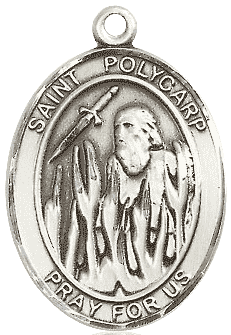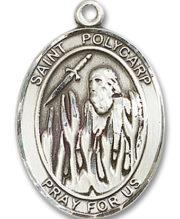Saints
St. Polycarp of Smyrna Medal – Patron Saint of Earaches
St. Polycarp Biography
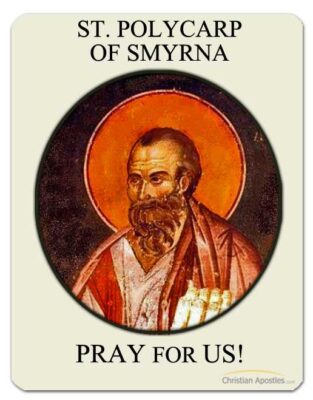 St. Polycarp of Smyrna was an early Christian bishop and martyr, who lived in the 2nd century AD. He is considered to be one of the Apostolic Fathers, a group of early Christian writers who had personal connections to the apostles of Jesus. He is known for his epistle, which is one of the oldest Christian texts that has survived to the present day.
St. Polycarp of Smyrna was an early Christian bishop and martyr, who lived in the 2nd century AD. He is considered to be one of the Apostolic Fathers, a group of early Christian writers who had personal connections to the apostles of Jesus. He is known for his epistle, which is one of the oldest Christian texts that has survived to the present day.
Polycarp was born in the city of Smyrna, which is now located in modern-day Turkey. He was a student of the apostle John, and was appointed bishop of the Church of Smyrna. He was highly respected by the Christian community and is believed to have been a close friend of Ignatius of Antioch.
In the late 2nd century, the Roman Empire began to persecute Christians. Polycarp was arrested and brought before the Roman proconsul, who demanded that he renounce his faith and make a sacrifice to the Roman gods. Polycarp refused, saying “”Eighty and six years have I served Christ, and He never did me any wrong. How then can I blaspheme my King and Saviour?””
As a punishment, Polycarp was burned at the stake. According to tradition, the fire would not consume him, so he was stabbed to death. His death was considered to be a great martyrdom and it was believed that he performed many miracles while he was in prison.
After his death, Polycarp became venerated as a martyr and his followers wrote a letter to the Church of Philomelium, describing his execution and the miracles that were said to have occurred at his death. This letter, known as the Martyrdom of Polycarp, is an important primary source for the study of early Christianity.
The epistle of Polycarp, is an early Christian letter, it’s considered to be one of the earliest Christian texts that has survived to the present day. It’s known for its teachings on Christian morality and its warnings against false teachings and false teachers. The letter is addressed to the Philippians, and it praises them for their steadfastness in the face of persecution.
Polycarp’s martyrdom and the letters written in his honor were widely distributed among the early Christian communities, consolidating his memory and establishing him as an important figure in the early Christian Church. He is venerated as a Saint by the Catholic and Orthodox churches, and his feast day is celebrated on February 23rd.
In addition to his reputation as a martyr and teacher, Polycarp is also known for his opposition to heretical movements such as Gnosticism, a doctrine that denies the material world and the flesh and their value, that in his time were affecting some of the early Christian communities, and his teachings were important in maintaining the orthodox belief in the early Christian Church.
The Life of St. Polycarp of Smyrna
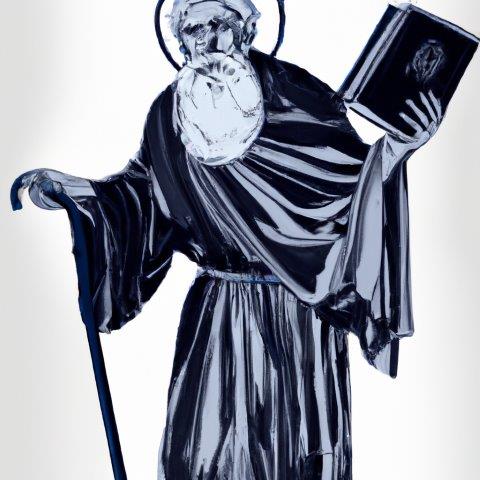 Have you ever wondered why Catholics wear a St. Polycarp medal or why Catholics consider Saint Polycarp the patron saint of earaches? As one of the earliest converts to Christianity St. Polycarp lived a holy life and remains a role model and patron saint of many.
Have you ever wondered why Catholics wear a St. Polycarp medal or why Catholics consider Saint Polycarp the patron saint of earaches? As one of the earliest converts to Christianity St. Polycarp lived a holy life and remains a role model and patron saint of many.
St. Polycarp was personally converted to Christianity by St. John the Evangelist, who appointed him Bishop of Smyrna, which he ended up governing for seventy years. As St. Ignatius of Antioch passed by Smyrna on the road to his martyrdom, St. Polycarp respectfully kissed his chains. These two saints were the link between the Apostles and future generations of Christians in Asia Minor, and together they changed the world through their words and deeds.
St. Polycarp the Martyr
During a period of great persecution for Christians, St Polycarp concealed himself in a neighboring village, but his whereabouts had been leaked to the authorities. When the authorities found his home, St. Polycarp responded: “God’s Will be done”. His challengers tried relentlessly to persuade him to call Caesar ‘Lord’, but he resolutely answered: “I shall never do what you desire of me”.
Three days before his martyrdom St. Polycarp saw in a vision his pillow on fire, so bright he had to shield his lives. from which he understood that he should be burnt alive. As he entered the chambers where the officials had assembled to watch his death, he heard a voice from heaven say: “Polycarp, be courageous, and act manfully”
This image of the martyrdom of St. Polycarp is depicted on the St. Polycarp Medal surrounded by the words, Saint Polycarp Pray for us.
Unwavering Faith and Strength
Again, when the authorities urged him to blaspheme Christ, Polycarp replied: “I have served Him these fourscore and six years, and He never did me any harm, but much good; how can I blaspheme my King and my Savior?”
The authorities continued to threaten Saint Polycarp with death by wild beast, hanging, and finally by fire. Whereupon St. Polycarp answered: “You threaten me with a fire which burns for a short time and then goes out; but are yourself ignorant of the judgment to come, and of the fire of everlasting torments which is prepared for the wicked. Why do you delay?”
The wood and other combustibles were heaped around him; his hands were tied; and after praying to Jesus for his executioners and thanking Him for allowing him to drink of His chalice, the fire was set to the pile. A powerful flame, far greater than would be possible given the size of the timber, encircled St. Polycarp’s body. But despite the raging fire, Saint Polycarp remained unharmed.
Seeing that the fire did not consume his body, he was pierced through the heart and his body burned. The Christians carried away the relics of the martyr, which they considered more precious than the richest jewels or gold, and buried them.
The image of Saint Polycarp remaining unburned amidst the flames, along with the sword that pierced his holy heart are depicted on the St. Polycarp Medal as a reminder for the wearer to stay steadfast in their faith amidst the trials of daily life.
St. Polycarp is the Patron Saint of Earaches
Today, the Catholic Church regards St. Polycarp as the patron saint of earaches and the patron saint of ears and all ailments of the ear. Once, St. Polycarp stated that we would rather not be able to hear anything at all than to hear heretical preaching and doctrine. For this reason we turn to Saint Polycarp as the patron saint of earaches
May all those who suffer of earaches or hearing loss turn to the intercession of St. Polycarp within their own lives. We pray that we may have the bravery to defend our faith despite the evils of outside forces. Saint Polycarp’s devotion to his faith and to Jesus Christ is an example to us all. May we all strive to do our best to use our ears to only hear the good news and resist the temptations of this world. Saint Polycarp, patron of those who suffer earaches, pray for us.
Popular St. Polycarp Medal and St. Polycarp Rosary
A St. Polycarp medal or a St. Polycarp rosary is a perfect gift to give to a young man who has chosen St. Polycarp as their confirmation name or any person who turns to Saint Polycarp as their patron saint. As the patron saint of earaches, wearing a St. Polycarp medal daily is a perpetual prayer for Saint Polycarp to intercede on behalf of the wearer. As saints are united closer to God, their prayers are more efficacious, and enriches your own prayer.
Additionally, a Saint Polycarp pendant is a reminder to emulate the example of the holy saint as live your life. What a beautiful testament of faith to share with the world, or to keep discretely tucked under your clothes. During the challenging moments of your day, reflect upon the holy life of St. Polycarp and pray for their intercession and protection.
Prayers to St. Polycarp
Prayer of Intercession Written by St. Polycarp
May God the Father,
and the eternal High Priest Jesus Christ,
build us up in faith and truth and love,
and grant us our portion among the saints
with all those who believe on our Lord Jesus Christ.
We pray for all saints,
for kings and rulers,
for the enemies of the Cross of Christ,
and for ourselves,
we pray that our fruit may abound
and that we may be made perfect in Christ Jesus our Lord. Amen.
Prayer when putting on a St. Polycarp Medal Necklace
God of all creation,
who were pleased to give the Bishop Saint Polycarp
a place in the company of the Martyrs,
grant, through his intercession,
that, sharing with him in the chalice of Christ,
we may rise through the Holy Spirit to eternal life.
Through our Lord Jesus Christ, Your Son,
who lives and reigns with You
in the unity of the Holy Spirit,
one God, for ever and ever.
Amen.
Prayer to St. Polycarp of Smyrna
St. Polycarp,
You were a faithful servant of God, willing to endure suffering and persecution for the sake of your faith. I ask for your intercession as I seek to strengthen my own faith and to remain steadfast in the face of opposition or difficulty.
May your example inspire me to be a person of unwavering faith, steadfast courage, and unshakable commitment to the Lord.
Amen.
Prayer to St. Polycarp of Smyrna
Dear St. Polycarp,
You were a teacher of the faith, spreading the Word of God to those around you. I ask for your intercession as I seek to share the Good News of the Gospel with others, always looking for opportunities to make a positive impact on the world.
May your example inspire me to be a person of passionate witness, joyful proclamation, and effective evangelization.
Amen.
Prayer to St. Polycarp of Smyrna
O St. Polycarp,
You were a man of integrity, standing firm in your convictions and living out your faith in all aspects of your life. Help me to be like you, seeking to live a life of holiness, and to be a person of unwavering faith and virtuous living.
May your example inspire me to be a person of moral courage, ethical integrity, and virtuous living.
Amen.
St. Polycarp of Smyrna: Patron Saint of Martyrs and Burn Victims
St. Polycarp of Smyrna was a 2nd-century bishop and martyr who is venerated as a saint by several Christian denominations. He is considered the patron saint of martyrs and burn victims.
St. Polycarp was a disciple of the apostle John, and he served as the bishop of Smyrna for over 60 years. He was known for his faith and his steadfastness in the face of persecution and torture. He was eventually arrested and burned at the stake for his beliefs, making him a model of faith and courage for generations of Christians to come.
As a result of his bravery and his devotion to his faith, St. Polycarp is considered the patron saint of martyrs. He is remembered as a powerful witness to the truth of the gospel, and as an example of how to remain steadfast in the face of persecution and suffering.
In addition to being the patron saint of martyrs, St. Polycarp is also considered the patron saint of burn victims. The story of his death by burning inspired many throughout history to pray for the intercession of St. Polycarp in the face of burns, either as a result of accidents or of martyrdom.
In conclusion, St. Polycarp of Smyrna is revered as a powerful witness to the truth of the gospel, and as a model of faith, courage, and perseverance. He is remembered as the patron saint of martyrs and burn victims, and his intercession is sought by those in need of strength and comfort in the face of persecution or injury.
Reflection on the feast day of St. Polycarp of Smyrna
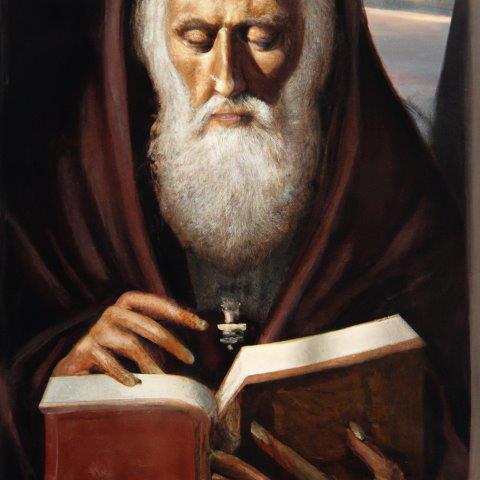 The feast day of St. Polycarp of Smyrna is February 23rd.
The feast day of St. Polycarp of Smyrna is February 23rd.
On the feast day of St. Polycarp of Smyrna, we remember and honor the life and legacy of a man who dedicated himself to serving God and spreading the word of Christianity. He was a bishop of Smyrna, and one of the early Christian martyrs, who is believed to have been a disciple of John the Apostle. He is often remembered for his leadership and his steadfastness in the face of persecution.
St. Polycarp’s life serves as a powerful reminder of the importance of faith and commitment. He stood firm in his beliefs, even when it meant risking his life, and he was willing to suffer for the sake of his faith. This is a powerful reminder that our faith should not be something that we hold lightly, but something that shapes and guides our actions and decisions every day.
St. Polycarp was also a strong leader, who guided and mentored the early Christian community. He was a role model for others, and his leadership helped to strengthen and grow the early Church. This is a reminder that we are all called to be leaders in our own way, and that by using our gifts and talents to serve others, we can make a positive impact on the world.
St. Polycarp’s unwavering devotion to his faith and his leadership, serves as an inspiration for us to be brave and faithful. His life is a powerful reminder that we are called to a greater purpose and that our actions do matter. His legacy is a call to us to be strong in our faith and to remain committed to our beliefs, even when it is difficult.
As we celebrate the feast day of St. Polycarp of Smyrna, let us remember his legacy and strive to emulate his example of faith, leadership, and commitment. By following in his footsteps, we can make a positive impact on the world and bring a little bit of light and love into the lives of those around us.
Discover biographies, prayers, and reflections for more than 400 Catholic Saints

